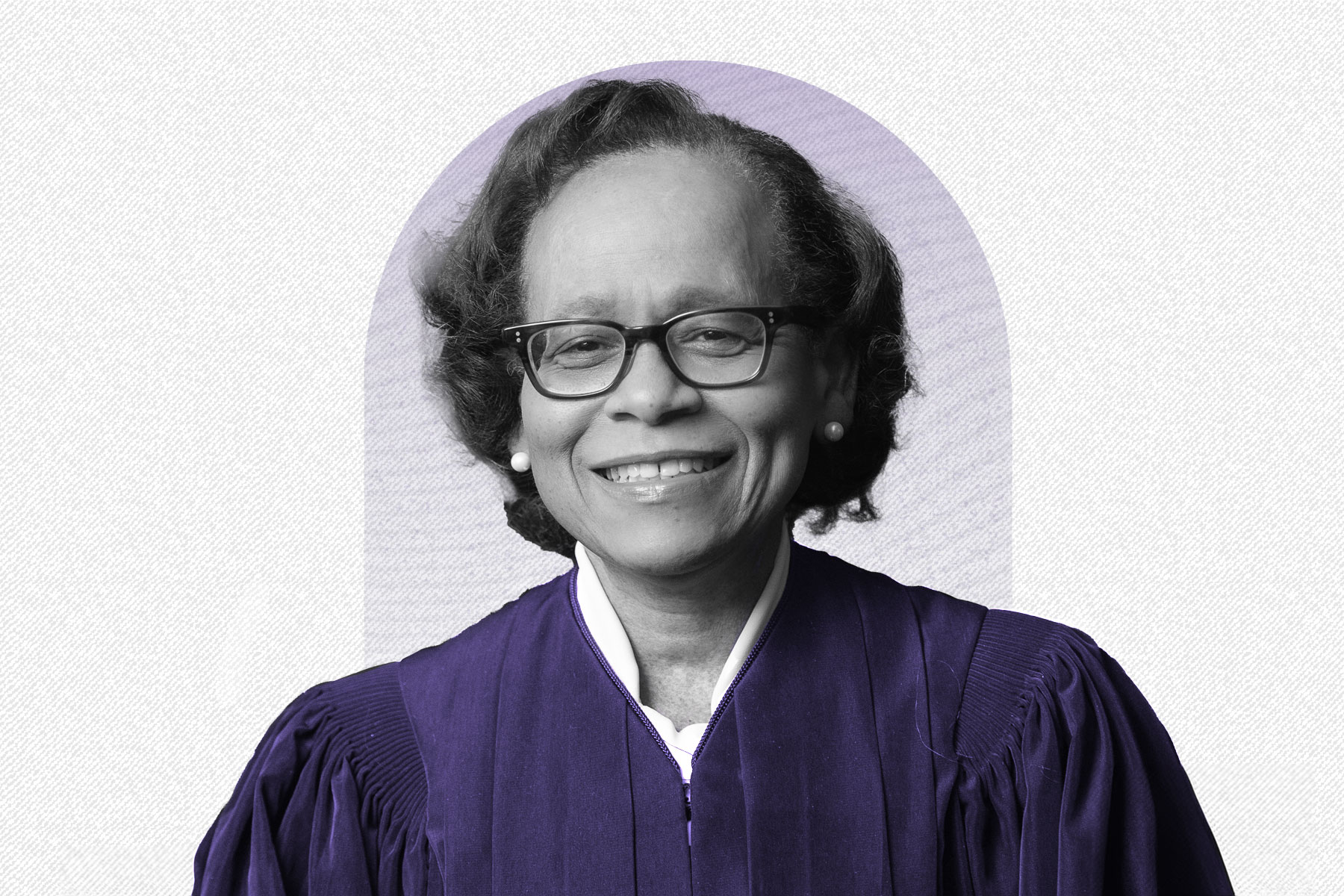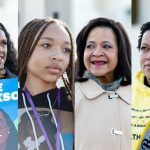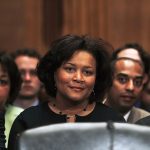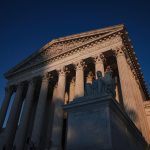When Natalie Hudson became the first person of color and only the third woman to lead as chief justice of Minnesota’s Supreme Court, she knew she would have an impact. Still, she was amazed when women approached her crying, wanting their daughters to see her and speak to her.
For Hudson, these experiences, which she has characterized as a bit disconcerting, prove the importance of representation and the need to normalize people of color in positions of authority. It was this need that pushed the attorney — whose career included practicing housing and employment law, being the St. Paul city attorney and working in the criminal appellate division of the Minnesota attorney general’s office — to move to the opposite side of the bench.
She did so in 2002, when Gov. Jesse Ventura appointed her to the Minnesota Court of Appeals. Then-Democratic Gov. Mark Dayton appointed Hudson to the state Supreme Court in 2015, and Gov. Tim Walz, another Democrat, appointed her as chief justice in October following the retirement of Lorie Gildea, the second woman to serve as chief justice.
For Women’s History Month, Hudson sat down with The 19th to discuss what her presence on the state high court means to her and for others.
This interview has been edited for length and clarity.
Darreonna Davis: Who are some of the women who have inspired you?
Natalie Hudson: My mother, obviously. My mom was a teacher, an educator, and she was a fierce, independent woman, and I took so much inspiration certainly from her. There were several Black female judges in the early days here in Minnesota that did not get much recognition but certainly paved the way for folks like myself. Pamela Alexander is one. She was the first Black female judge in Minnesota. Rosalie Wahl, she was a White justice on the Minnesota Supreme Court. She was the first female on our court and was just a champion for women and for the downtrodden. And I so admire Sandra Day O’Connor as well. I mean, what she took on in those early years as the first female on the U.S. Supreme Court, that’s no small task.
I wanted to talk briefly about the makeup of the current court because you all are going to be changing soon. Associate Justice G. Barry Anderson is retiring soon. That’ll leave you all with three women justices and three men justices. Do you have any insight about whether or not you all could become majority women at any point?
It’s hard to say, and it is not up to me because these are gubernatorial appointments. But yes, the court is changing dramatically. Typically, courts like ours, the highest court in the state, stay pretty static for years. It’s a little unusual to have this level of turnover, but it’s driven by a couple of things. One, in Minnesota, we have a mandatory retirement age of 70 for state court judges. So in that sense, we are unlike the federal courts, or like the U.S. Supreme Court where you can serve as long as you want. Justice Anderson, who’s leaving us in May, he’s leaving because he turns 70 very shortly. And then Justice [Margaret] Chutich will be retiring in July. She’s not quite 70, she’s about 65, but she’s just decided to do some other things in life. And then, when I was promoted to chief, a new justice took my spot.
We will have essentially three brand new members here in the span of about a year. You find that on a court of our size with seven members, anytime you pull even one person out of that dynamic, it changes the dynamic of the court considerably. That’s going to be our challenge, and I think my challenge, as chief, is to make sure that the court as an institution maintains its standards [and] that we continue to be the collegial group that we’ve always been. We’ll see what the governor does in terms of the makeup in terms of gender and otherwise.
A part of your career was serving as the city attorney for St. Paul and, recently, they swore in an all-women city council. Do you think the Twin Cities are moving in a positive direction in terms of diversity and representation?
I think we are. The new St. Paul City Council is just an amazing thing … and I’m sure they will make their mark.
I think in all areas of our public lives, it is so important that you see diversity in background and experience because that brings a multitude of perspectives. In our case, from the judiciary, a multitude of perspectives come in with respect to the interpretation of the law. What might be a reasonable police stop to some for one person might not seem so reasonable if you’re an African-American man, for instance. So, just bringing those perspectives to bear, I think, is important.
Representation is so important. It matters, and it reaffirms the message that your race and your gender and your ethnicity and/or your orientation, that that’s not indicative of or doesn’t speak to your capabilities. It is so critical for our young people — particularly people of color — because we covet with our eyes. We strive for what we can see, and when you see people of color and women of color and other people of color in positions of authority, it begins to plant that seed that, “yes, I can do that, too.”
I think it also sends a message to our entire communities because so often, as people of color, and certainly as Black people, we’re viewed with such suspicion and as threats and as sort of the other. It’s important for our fellow White citizens to see people of color in positions of authority and not as threats. That also goes to trust and confidence in the judiciary. It’s hard to trust in the judiciary, when no one looks like you.
You speak highly about your father, who was the first Black football coach at Macalester College. But you said he didn’t really think of himself as a trailblazer as much as he just did the work that he loved. Do you see yourself as a trailblazer, and how has the desire for more diversity in positions of power factored into your decision to become a judge?
Well, I absolutely see myself as a trailblazer. The profession, in general, is largely still predominantly White, and that’s certainly true here in Minnesota, but I think that’s true nationally as well. So, I think just being a person of color and being a Black attorney, in and of itself, is still being a trailblazer in many ways, and certainly as a judge and as an appellate judge. As the first Black chief justice of the Minnesota Supreme Court, I certainly recognize the historic nature of that occasion, and I’m honored by it. I’m humbled by it. I feel the weight of it in some respects, and I think that that’s normal when you step into a role of this magnitude.
One of the things I noticed after a few years as an appellate attorney is that I seldom saw any women on the bench and so few people of color on the bench. There comes a time — or at least it did for me — when the irony of that kind of hits you. Because if you look back at our history as Black people, you see how fundamentally and dramatically the law has affected our lives as a community and as a race. We look at decisions like Plessy vs Ferguson and Brown vs the Board of Education and things like that. Even as women — your organization is named after the 19th Amendment. The law has affected women in some profound ways as well, but as women and as people of color, we’ve had very little impact over the years on the law ourselves. I mean, we’ve been the recipients of it, but we’ve had very little impact. And that’s what I think ultimately pushed me to want to become a judge.
Being a judge is tough work, and you’ve talked about the weight of being the first person of color in your position. What do you do to practice self-care and manage stress?
Sadly, when you look at white-collar professions, we [legal professionals] have some of the highest rates of substance abuse and depression, anxiety and all of that. I think, periodically, look at your life and make sure it’s not out of balance. I tell younger lawyers: don’t forget about the things you liked to do before you were a lawyer. If you like to walk, you need to make sure you keep walking. If you like to do yoga or Taekwondo or whatever it is, you need to create that space on your calendars as well. And there’s nothing wrong with white space on your calendar. Sometimes it’s good to have nothing there so that nothing time is time when you’re resting or time when you’re going for that walk or time that you’re spending with your spouse or your significant other and doing something other than whatever your profession is.
I like to walk, so I walk quite a bit, and that’s a stress reliever for me. I try to make sure I still do that.
We saw recently an Alabama Supreme Court judge use his faith to justify why embryos are children. As the wife of a former pastor and police chaplain, what role does your faith and religion play in your decision-making as a judge?
Judges are not blank slates. We bring all of who we are to what we do. And I think a part of who I am is certainly my faith. It impacts my decisions in the sense that I’m keenly aware of just making sure I’m asking the right questions. Is everyone here that’s coming before us being treated in the same fashion, and are we applying the law evenly? Those things certainly come to bear.
I do more administrative things now as chief justice than I did as an associate, and so I am keenly aware of, “OK, we’ve got this policy decision that I need to make. I need to get advice from various sectors. Who’s not at this table?” And so it’s just a matter of fairness and equity, and I think, obviously, my faith informs that to some degree.
We [judges] are interpreters of the law. Well, you interpret from a particular lens. A certain lens will make you ask questions that maybe your colleague next to you will not ask, and I think it’s the informing and the asking of those questions that gets you to the best decision.
What is one thing anybody should know about you as a professional, person of color and woman doing this work?
My assistant pastor at our church reminded me one day of an old saying, “if you want to go fast, go alone, but if you want to go far, go with someone else,” and I’ve always loved that. I think that’s so important for us, as Black professionals in particular. We need the support of one another. You need folks to lift you up. It should not be — and hopefully it is not — a solitary journey.
In my later years of my career, I have what a friend of mine calls that kitchen cabinet: that two or three people who you know you can talk to without judgment and who will give you honest feedback.
My other favorite quote comes from the late Sandra Day O’Connor. I’m paraphrasing, but she says something like it’s not important that I’m going to make decisions as a woman, but that I am a woman who gets to make decisions. I thought that was huge. It really goes back to that representation piece we were talking about earlier, that I’m there, I’m in the room, I’m on the court. The representation. My presence. The empowerment of me being here as a woman is key.
I see that for myself as well. It’s not so much that I’m gonna make decisions as a Black person, but that I am a Black person in a position to make the decisions. That’s the key for me, for my community and for those who will follow me, that we need to be in those positions of authority to lend legitimacy to our institutions.







